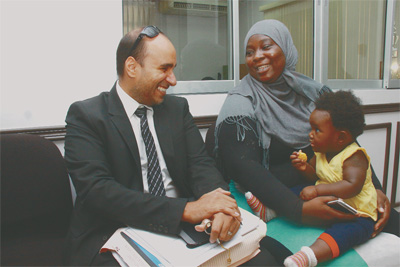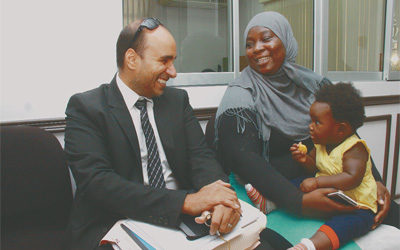This post was written by Guest Contributor Saffiyya Mohammed. Saffiyya tweets at @saffiyyam.
Living in the Caribbean has its perks; and believe it or not, it also has its drawbacks. With our colonial past, it’s become a melting pot for people over the world, with societies comprised of African, Indian, Chinese, Middle Eastern, European and Indigenous peoples. One such island is Trinidad, a country that also has a deeply embedded colonial past.
With such a history, Trinidad is multi-religious as well, and many families have people of different faiths within them. Trinidadian society appears accepting of all faiths, attributing that to our diverse heritage, of which many are proud despite the colonial circumstances, which led us to all living in the same place.
When it comes to the ethnic makeup of the local Muslim population, the majority is of East Indian descent , with many mosques having a majority of East Indian descent congregants. Very few of them have a majority Afro-Trinidadian congregation, although accurate data isn’t always readily available.
Socially speaking it’s assumed that most Afro-Trinidadian Muslims are converts, as many Africans who were enslaved in plantations were forced to give up their religion and accept Christianity. In the US, some studies estimate that up to 30% of enslaved Africans were Muslim. However, to my knowledge, there isn’t any such research about the Caribbean yet. Nonetheless, Afro-Trinidadian Muslims may actually be returning to the religion of their ancestors.
Islam is a minority religion in a country that is largely Christian, and Afro-Trinidadians are a minority among Muslims in the country. Hence, Afro-Trinidadian Muslim converts may face isolation. This may happen both in Muslim communities and society at large. After congratulatory embraces and welcomes to the faith, long-term resources are not always available to those who are new to the faith, especially those who don’t have familial support in their decisions.
In recent years, there have been a few instances of discrimination against women who wear hijab, particularly targeting Afro-Trinidadian converts in the workplace. In one such incident, an employee was dismissed from her new job because she wore hijab. Whereas she interviewed wearing hijab and the company assured her that the head cover would not be an issue, she was dismissed on her first day due to it. In another two instances Muslim women were dismissed from security-related jobs after deciding to start wearing hijab. The women faced disciplinary action because their hijab was perceived by management as either hindering them from doing their job, or not complying with the uniform.

Giselle Glaude, one of the women experiencing discrimination due to her hijab – Via Guardian.
This brings into question other women of other faiths who cover their hair, and whether or not, if placed in similar situations in the workplace, would have experienced the same, or is it Islamophobia rearing its head in Trinidadian society?
I’ve not considered Trinidadian society to be “overtly” racist, although we do have racist micro-aggressions which have been regarded part of our culture, as part of daily life for some, or many, depending on who you talk to. But that perception may also be the result of narratives that present Trinidadian society as one where people live in harmony with each other. As a result, reports of someone being attacked because of their race aren’t always common knowledge to those who are less affected.
The incidents of hijab discrimination mentioned above, all occurred at different times but became public around the same time period, with one incident being a hot button topic on social media. There was a short-lived outcry with many people of different backgrounds showing their disapproval of the situation. However, in the days after this incident, the outcry faded away.,.
What wasn’t evident was the institutional support of local Muslim communities, which may be in part due to the many different Muslim organisations in the country, which do not always act in cohesive ways. That lack of solidarity from Muslim communities was noteworthy in this and other incidents that followed.
Further, from personal experience, the lack of solidarity from Muslim communities may have to do with the intersections of anti-Blackness, classism and colourism. Racism within the local Muslim communities is seldom acknowledged, much less addressed. Being new to the faith and trying to learn the religion, implement it into your life, finding a community and knowing that where you go in search of that community may very well treat you as the other, is challenging to Afro-Trinidadian converts.
When some of incidents of Islamophobia and discrimination against hijab-wearing Muslim women became known to the public, there wasn’t a flurry of responses from established Muslim organisations. This raises a number of questions, including their ability to respond in an effective manner to instances of Islamophobia; their willingness to support Afro-Trinidadian converts; and their ability to provide tangible supports (i.e. legal support) to those who face discrimination. Issues of public hijab discrimination bring up the question of Islamophobia, and racial discrimination both in Trinidadian Muslim communities and in society at large. Much of the incidents target primarily Afro- Trinidadian Muslims; if the same situations had happened to hijab wearing women of other backgrounds, primarily light skinned, what would be the local Muslim communities’ responses? Would there have been support from most organisations, and what would’ve been done to change public perception of hijab and to support the women facing discrimination? Finally, what would’ve been done to make sure these incidents don’t happen again?
It’s one thing to have support from a wider community. However, when your local community, a community that from prophetic example, claims to focus on strengthening ties and lending support to its own members regardless of class and race,, does not live up to its claims, it leaves much to be wanted.
Leaving Afro-Trinidadian converts, particularly women, isolated and having to stand up for their religious freedom and their right to equality, while being new to the faith is something to reflect on. As Muslim women of different backgrounds that would like to see similar support to be lend to them, it is important to reflect on our allyship. Further, Muslim men should be asking what Afro-Trinidadian Muslim women, and Muslim women in general need from them, rather than speaking on our behalf.
Issues of Islamophobia and hijab discrimination don’t exist in a vacuum. Women who aren’t supported in the wider community, seldom are supported in smaller ones. Incidents of hijab and other forms of discrimination appear in Trinidadian society, serve to point out privilege and gaps in Muslim communities within the country.
Incidents such as these shouldn’t be regarded as one-off events, but rather as a starting point to recognizing that some Muslim women are more privileged than others. This should also serve to further explore how shortfalls in Muslim communities should provide motivation to do better, and there’s much work to be done, but who’s going to do it?

